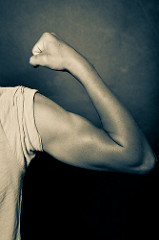Athletes and frequent gym-goers can tell you a lot about the pain associated with sore muscles, but an inactive person is just as likely to experience muscle soreness; muscle pain can come from injury, overuse, or tension. You have probably suffered from sore muscles at some point in your life, but what should you do to effectively alleviate the pain? One source of easy pain relief can come from taking painkillers like ibuprofen, while cold-and-heat therapy offers similar relief without the heart attack risks associated with nonsteroidal anti-inflammatory drugs. There are multiple forms of heat therapy, such as using hot water, heating pads, and heat wraps. Heat wraps are available for certain areas of the body (e.g. neck, shoulders, and legs), and they become less effective when applied on joints like the wrists and knees. Fortunately, a recent development may fix that inconvenience.
Image source: Patrik Giardino
Researchers have created a mesh heater that comfortably fits at the joints. The main material used to create this product is silver nanowires, which are comparable in size to strands of human hair. The researchers tested the mesh on wrist and knee joints and found that the mesh continued to provide heat despite being stretched. The ability of the product to provide heat from all of its surface area is unique and superior to other heat wraps that only offer heat in certain regions. Also, because the mesh works on battery power, it is more convenient to use than the heating pads that require cords and outlets.
The researchers believe that there are many applications for their product. In addition to heat therapy, the mesh heater could be modified for other purposes, such as heat enhancement in athletic clothing or seat warmers in cars.
Feature Image Source: Muscles 🙂 by Lerkoz










